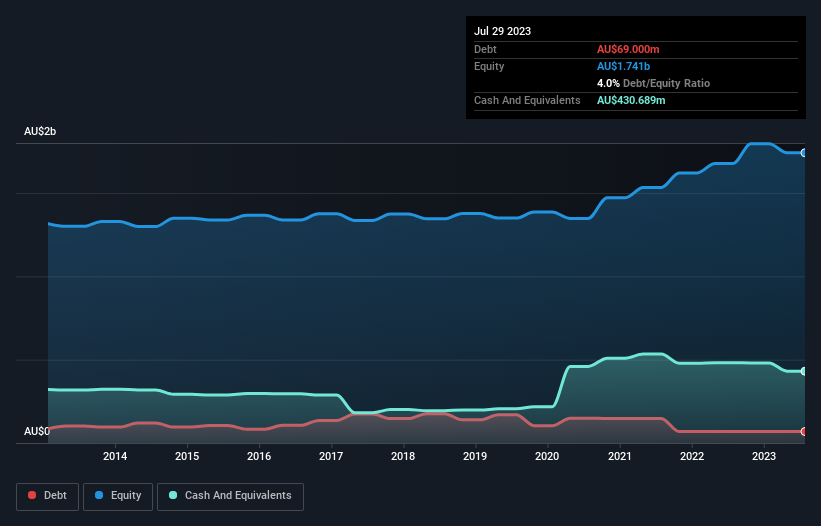- Australia
- /
- Specialty Stores
- /
- ASX:PMV
These 4 Measures Indicate That Premier Investments (ASX:PMV) Is Using Debt Safely
Share

Howard Marks put it nicely when he said that, rather than worrying about share price volatility, 'The possibility of permanent loss is the risk I worry about... and every practical investor I know worries about.' So it might be obvious that you need to consider debt, when you think about how risky any given stock is, because too much debt can sink a company. We note that Premier Investments Limited (ASX:PMV) does have debt on its balance sheet. But should shareholders be worried about its use of debt?
What Risk Does Debt Bring?
Debt and other liabilities become risky for a business when it cannot easily fulfill those obligations, either with free cash flow or by raising capital at an attractive price. Ultimately, if the company can't fulfill its legal obligations to repay debt, shareholders could walk away with nothing. However, a more usual (but still expensive) situation is where a company must dilute shareholders at a cheap share price simply to get debt under control. Having said that, the most common situation is where a company manages its debt reasonably well - and to its own advantage. The first thing to do when considering how much debt a business uses is to look at its cash and debt together.
Check out our latest analysis for Premier Investments
What Is Premier Investments's Net Debt?
As you can see below, Premier Investments had AU$69.0m of debt, at July 2023, which is about the same as the year before. You can click the chart for greater detail. But on the other hand it also has AU$430.7m in cash, leading to a AU$361.7m net cash position.

How Healthy Is Premier Investments' Balance Sheet?
The latest balance sheet data shows that Premier Investments had liabilities of AU$336.0m due within a year, and liabilities of AU$440.8m falling due after that. On the other hand, it had cash of AU$430.7m and AU$24.9m worth of receivables due within a year. So it has liabilities totalling AU$321.2m more than its cash and near-term receivables, combined.
Since publicly traded Premier Investments shares are worth a total of AU$4.43b, it seems unlikely that this level of liabilities would be a major threat. Having said that, it's clear that we should continue to monitor its balance sheet, lest it change for the worse. Despite its noteworthy liabilities, Premier Investments boasts net cash, so it's fair to say it does not have a heavy debt load!
Premier Investments's EBIT was pretty flat over the last year, but that shouldn't be an issue given the it doesn't have a lot of debt. The balance sheet is clearly the area to focus on when you are analysing debt. But ultimately the future profitability of the business will decide if Premier Investments can strengthen its balance sheet over time. So if you want to see what the professionals think, you might find this free report on analyst profit forecasts to be interesting.
Finally, a business needs free cash flow to pay off debt; accounting profits just don't cut it. While Premier Investments has net cash on its balance sheet, it's still worth taking a look at its ability to convert earnings before interest and tax (EBIT) to free cash flow, to help us understand how quickly it is building (or eroding) that cash balance. During the last three years, Premier Investments generated free cash flow amounting to a very robust 99% of its EBIT, more than we'd expect. That positions it well to pay down debt if desirable to do so.
Summing Up
We could understand if investors are concerned about Premier Investments's liabilities, but we can be reassured by the fact it has has net cash of AU$361.7m. And it impressed us with free cash flow of AU$343m, being 99% of its EBIT. So we don't think Premier Investments's use of debt is risky. Given Premier Investments has a strong balance sheet is profitable and pays a dividend, it would be good to know how fast its dividends are growing, if at all. You can find out instantly by clicking this link.
If, after all that, you're more interested in a fast growing company with a rock-solid balance sheet, then check out our list of net cash growth stocks without delay.
New: Manage All Your Stock Portfolios in One Place
We've created the ultimate portfolio companion for stock investors, and it's free.
• Connect an unlimited number of Portfolios and see your total in one currency
• Be alerted to new Warning Signs or Risks via email or mobile
• Track the Fair Value of your stocks
Have feedback on this article? Concerned about the content? Get in touch with us directly. Alternatively, email editorial-team (at) simplywallst.com.
This article by Simply Wall St is general in nature. We provide commentary based on historical data and analyst forecasts only using an unbiased methodology and our articles are not intended to be financial advice. It does not constitute a recommendation to buy or sell any stock, and does not take account of your objectives, or your financial situation. We aim to bring you long-term focused analysis driven by fundamental data. Note that our analysis may not factor in the latest price-sensitive company announcements or qualitative material. Simply Wall St has no position in any stocks mentioned.
About ASX:PMV
Premier Investments
Operates various specialty retail fashion chains in Australia, New Zealand, Asia, and Europe.
Flawless balance sheet 6 star dividend payer.

